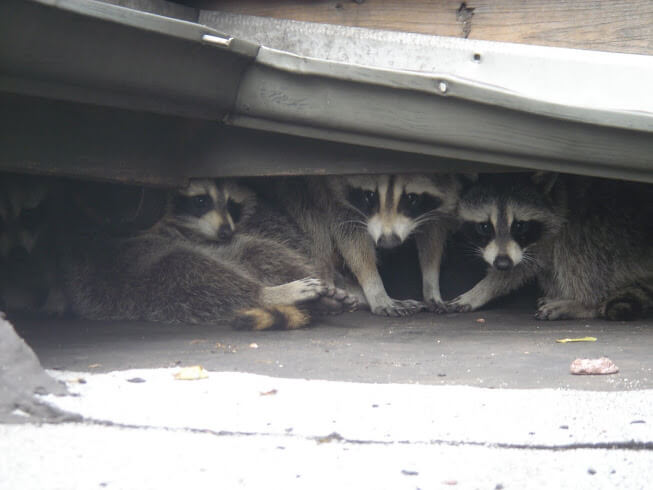Raccoons are known for their mischievous and industrious natures. Their masks are no disguise when the masked bandit raids the rubbish bin. It is undeniably this creature’s most recognizable feature. Even when homeowners do not witness their thievery, they usually know what to blame. Raccoons are one of the only wild animals in these parts that can manage to unscrew, unclip or unlatch any containers we’ve casually thrown away.
Most homeowners are also well aware of the animal’s tendency to take advantage of our attics almost as often as our trash receptacles. They are good little climbers and excellent problem solvers. If they want in, they often find a way. What many people don’t realize is that their basement may be almost as appealing as the attic, especially if access is easy! A cornered raccoon is a dangerous raccoon, so if you discover one in your home, make sure you contact our humane raccoon removal Durham experts.
Raccoons Down Under
The basement might not seem like an ideal raccoon hangout. Human occupants visit and use it far more frequently than the attic, so it does not provide the same degree of peace and quiet found in an attic. The basement is usually colder and damper than the attic as well. Given a choice, raccoons would opt for the dry and warm environment instead.
These animals are opportunistic, and they aren’t ones to turn down a shelter that is easy to access if it provides them with enough safety and comfort. Basements are not as hard for raccoons to enter as you might think. They often discover the openings where pipes or utility cables run through the foundation. With a little bit of elbow grease, they make the hole large enough to slip on in. Other common entry points include open vents and furnace chimneys.
A Raccoon’s Discouragement
Wherever the masked bandit settles inside your home, it causes a significant amount of damage and creates a health hazard. A raccoon’s handiwork weakens the foundation. They also tear up insulation and can damage ducts and vents. Raccoons carry rabies and can transmit other diseases through their urine and feces. You can avoid these dangers by making it harder for the rascals to get in.
You can discourage raccoons by sealing off all potential entry points. These little creatures have very strong and dexterous hands, so even small holes should be sealed. Vent openings need raccoon-proof mesh coverings that keep the masked bandit out while allowing air to continue flowing.
Raccoon Relief
Raccoons are nocturnal, so they work by night and sleep by day. As such, it is entirely possible to catch one off-guard as you wander into your basement to do laundry in the middle of the day. If you see one sleeping, don’t wake it. If it’s too late, and your actions cause it to stir before you even know it is there, it is important to remain calm. Do not approach it.
Though raccoons aren’t typically aggressive, they often become so if they feel trapped or threatened. A mama raccoon is also likely to put up a fight to protect her babies. Furthermore, you can’t always tell when one is infected with rabies, as they can carry the disease without getting sick. The safest way for a homeowner to take care of a raccoon in the basement is to enlist the help of our humane raccoon removal Durham professionals.
Who Can You Call for Help?
Skedaddle technicians are experts in humane wildlife removal. We utilize methods that are designed to keep adults and kits safe in the process. Once the animals are removed, they are taken to a more suitable habitat, and the babies are reunited with their mother. We also clean up any contaminated materials and surfaces and seal off entry points to prevent future intrusions. If you need help with a raccoon problem, contact us today!



